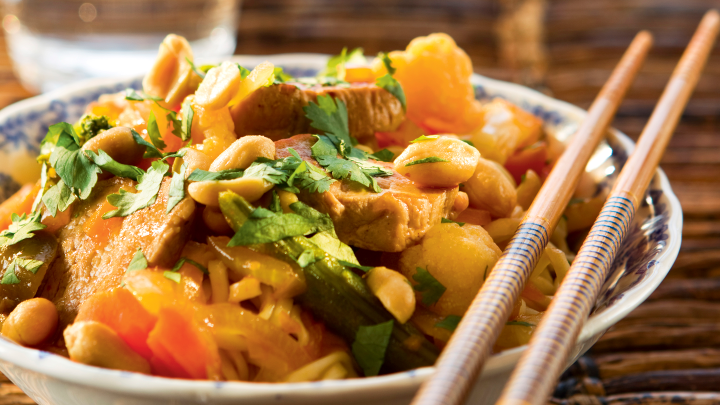TRACE YOUR PRODUCTS
K Group is constantly striving to improve the transparency of its purchasing chains. On this website, our customers can find out more about where the products they purchase from K Group stores come from.
Where do mywear t-shirts, Pirkka and K-Menu tuna products, Pirkka Fairtrade roses, and PROF Timber sold in our stores come from? We want to increase the transparency of our purchasing chains by providing information on the origin of our products and their journey to our stores. Choose a product to find out more.

The pineapple used in Pirkka and K-Menu canned pineapple is the Smooth Cayenne variety and comes in slices and chunks and as crushed pineapple. The canned pineapple is a good-quality, inexpensive and carefree choice for everyday use – even as a substitute for fresh fruit. The pineapple is canned in its own juice with no added sugar.

The pineapple (Ananas comosus) is the best known member of the tropical pineapple plant family (Bromeliaceae) and it is mainly used as a food crop. It, like some other forms of the genus, is also a good houseplant. Pineapples are originally from South America.

When choosing food items for a stockpile, pay attention to the shelf life of the food and the method of preparation. Canned pineapple has a long shelf life and can be eaten uncooked. It is not a good idea to hoard food that you don't like and is better to stockpile food that is otherwise easy to use in daily life.
The pineapple is a tropical plant that was cultivated by the ancient indigenous peoples of South America. It was brought to Europe by the explorer Christopher Columbus in 1494. The pineapple was considered a rare, luxury fruit in Europe, so it became a symbol of hospitality. For example, you can still find pineapple carvings on the gateways of old manor houses in the UK.
The pineapples for Pirkka and K-Menu canned pineapple are grown in Thailand, which is now one of the world’s largest producers and exporters of pineapples. Smallholders, who generally cultivate an area of between 1 and 5 hectares of land, account for more than 95 per cent of all pineapple producers. Over the past five years, the average annual production amounted to two million tonnes. The total production area of around 100,000 hectares is spread over thirteen provinces, but most of the pineapple farms are located along the east and west coasts of the Gulf of Thailand.
Pineapple plants are planted from the cuttings of mother plants. The fruit of the pineapple grows on bushes about a metre high.
Harvesting takes place between March and July in the summer season and between October and February in the winter season. The ripe fruit weighs between one-and-a-half kilos and three kilos. The pineapples are picked by hand.
Below you can see the supplier and factory where Pirkka and K-Menu canned pineapples are processed.
Kesko uses global social responsibility audit and certification systems, primarily amfori BSCI audits, in the assessment of working conditions at factories and plantations in risk countries. Social responsibility audits and certifications are used to assess the safety of working conditions in production, the salaries and working hours of employees and their rights of freedom of association and collective bargaining. The use of child or forced labour is strictly forbidden. The factory supplying the canned pineapple has been included in the social responsibility auditing of amfori BSCI since 2016.
There are certain issues that may be related to pineapple production, in particular due to the seasonal nature of the work and the use of migrant workers. Outside the harvest season, the factory may be closed for several months. When the production lines are out of service, workers are not always paid, even though this is required by law. Many of the human rights concerns related to recruitment stem from the recruitment and documentation fees charged for migrant workers which, according to international human rights standards, should be paid in full by the employer. Charging migrant workers for the recruitment fees has been against the law in Thailand only since 2017. Large amounts of fertilisers and pesticides are also generally used, which is harmful to the farming environment.
Pirkka and K-Menu canned pineapples come from a factory where workers are paid even when production lines are temporarily closed between seasons. Around half of the workers are from Thailand and the rest come from Laos, Myanmar and Cambodia. The supplier company is responsible for paying in full all the recruitment and documentation fees related to the recruitment of migrant workers.
The plantations where Pirkka and K-Menu canned pineapples are grown have a programme and plan to reduce the use of fertilisers and pesticides by replacing them with organic alternatives. To prevent biodiversity loss and manage soil nutrient balances, short breaks are taken in cultivation or other crops are cultivated between the pineapple growing seasons.
Pineapple is especially delicious in fruit salads and other desserts, such as sorbets. In main courses, it adds sweetness to chicken, pork and fish dishes. It is also worth trying pineapple in salads, as well as in sweet and sour and other Asian dishes. It is also delicious grilled on a barbeque.
Canned pineapple is convenient to use and easy to divide into portions. Canned pineapple is available all year round and its softer texture compared with that of the whole fruit makes it easier to use in recipes which require soft fruit.
